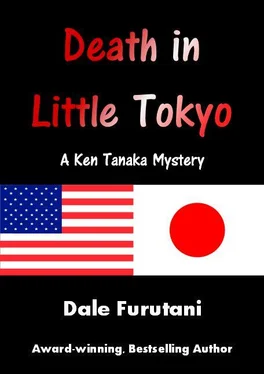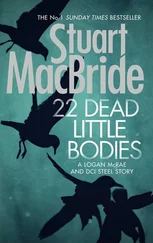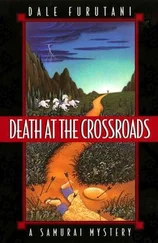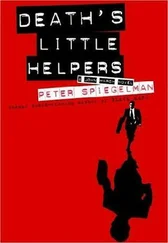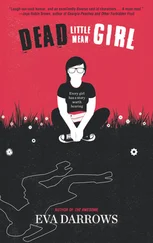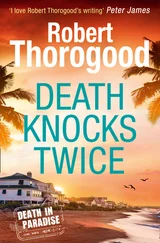Dale Furutani - Death in Little Tokyo
Здесь есть возможность читать онлайн «Dale Furutani - Death in Little Tokyo» весь текст электронной книги совершенно бесплатно (целиком полную версию без сокращений). В некоторых случаях можно слушать аудио, скачать через торрент в формате fb2 и присутствует краткое содержание. Год выпуска: 2012, Жанр: Криминальный детектив, на английском языке. Описание произведения, (предисловие) а так же отзывы посетителей доступны на портале библиотеки ЛибКат.
- Название:Death in Little Tokyo
- Автор:
- Жанр:
- Год:2012
- ISBN:нет данных
- Рейтинг книги:3 / 5. Голосов: 1
-
Избранное:Добавить в избранное
- Отзывы:
-
Ваша оценка:
- 60
- 1
- 2
- 3
- 4
- 5
Death in Little Tokyo: краткое содержание, описание и аннотация
Предлагаем к чтению аннотацию, описание, краткое содержание или предисловие (зависит от того, что написал сам автор книги «Death in Little Tokyo»). Если вы не нашли необходимую информацию о книге — напишите в комментариях, мы постараемся отыскать её.
Death in Little Tokyo — читать онлайн бесплатно полную книгу (весь текст) целиком
Ниже представлен текст книги, разбитый по страницам. Система сохранения места последней прочитанной страницы, позволяет с удобством читать онлайн бесплатно книгу «Death in Little Tokyo», без необходимости каждый раз заново искать на чём Вы остановились. Поставьте закладку, и сможете в любой момент перейти на страницу, на которой закончили чтение.
Интервал:
Закладка:
“Great,” I said with genuine pleasure. “I just love Yojimbo, and I’ve never seen the sequel.”
Mariko checked her watch. “We’ve got almost an hour to get there,” she said. “So there’s plenty of time.”
We left the restaurant and drove my Nissan onto the Santa Monica Freeway, then onto the San Diego Freeway and off on Santa Monica Boulevard. There was the NuArt, a theater that plays a whole series of revival movies and classics.
Yojimbo (“The Bodyguard”) is the story of a down-and-out samurai who comes into a town inhabited by thieves, thugs, and gamblers. The plot and staging are set in 1860 Japan, but the action and characters are taken right out of an old-fashioned American western. In fact, a Clint Eastwood western, A Fistful of Dollars, was later made using Yojimbo’s plotline.
Toshiro Mifune plays the samurai hero of the movie with a worldly, swaggering style, and his sagacity and martial skills are in sharp contrast to his grubby and disheveled appearance. I’ve seen Yojimbo three or four times, but I enjoyed it just as much this time as when I first saw it.
As do many people, I love movies. They form a common base for allusions in our society. Two hundred years ago educated people could allude to Greek myths and others would understand. A hundred years ago allusions to the Bible could be used and understood. Now it’s movies.
Kurosawa movies are a special favorite of mine, and a double bill of his early samurai movies was perfect. In the second movie on the bill, Sanjuro, Mifune plays the same down-and-out samurai, but this time he’s involved in fighting corruption within a clan. He helps a group of young boys to understand that appearances of people are not always indicators of what kind of heart and intentions they have. It reminded me of Rita Newly. In Sanjuro, the handsome statesman in the clan turns out to be a crook and the horse-faced administrator, the butt of caustic comments from the boys, turns out to be a capable leader interested in clearing up the corruption in the clan.
There are the typical Kurosawa twists and turns in the plot, with plenty of humor and action. The bad but handsome statesman kidnaps the good administrator, and Mifune and the boys want to rescue him. Unfortunately the boys keep dashing around like Kabuki samurai messing things up. Mifune uses his wits, skill, and experience to discover where the kidnapped administrator is being held.
After the boys have upset another of his efforts to rescue the administrator, Mifune sits with them in a hiding place scolding the boys for their foolish action and false steps, which constantly delay the resolution of the problem. ‘At this rate, I’ll be an old man,’ the subtitle read on the screen as Mifune used his samurai sword in an effective parody of an old man with a walking stick.
After many misadventures, Mifune finally leads the boys in a successful effort to rescue the rightful head of the clan. Then, at the end, there’s a tense standoff between Mifune and the chief villain. They stand facing each other for long minutes and finally engage in a quick-draw contest right out of a “B” western. Only in this movie they used swords instead of guns. Mifune, of course, wins. The boys, who witnessed the quick-draw duel, are full of admiration for Mifune. But Mifune is furious with the way the boys glorify violence. ‘The best swords stay in their scabbard,’ Mifune warns.
I thought about what I had seen on the screen for a long time afterward. In a way it was a kind of epiphany. But the transformation that comes with an epiphany is an emotional, not a logical, experience. And what was necessary to transform what I knew into what I could prove was logic and facts, not a sudden inspiration.
22
The next morning I called Evan Okada at the Times. I was almost surprised to get him personally instead of a voice mail system. Such is the pervasiveness of technology. He seemed less wary of me this time; almost friendly.
“Can you tell me some more about the Yakuza and show business?” I asked.
“Sure, what do you want to know?”
“Do you think the Yakuza would get involved in something like a burlesque theater?”
“Here, or in Japan?”
“Here.”
“I doubt it. There just isn’t that much money involved in something like that. The American branch of the Yakuza is involved in a few bars in Gardena and Orange County that cater to Japanese businessmen living in the area, but that’s all I know of. The Yakuza involvement in show business is mostly localized to Japan.”
“So they wouldn’t be involved with someone like a stripper here in L.A.?”
“That would be unlikely. What do you have in mind?”
“I met a woman in Matsuda’s room on the night of his murder who said she was a stripper at a local burlesque theater. I was wondering what the Yakuza’s involvement might be with her.”
Evan paused. “I suppose it’s possible, but I still think it’s unlikely. There are a lot of Yakuza in Hawaii, but they aren’t that active here in California yet. I can’t imagine they would get involved in penny-ante stuff like a burlesque theater. They all seem to have bigger fish to fry.”
I sighed. “Okay. So much for that idea.”
“What idea?”
Evan’s reporter’s instincts were aroused.
“I just had a notion about Matsuda’s murder. Both the Yakuza and the Americans arrested the other day denied they killed Matsuda, and I had an idea about the killing.”
“Which was?”
A leading question. Evan was in full reporter mode now. “Which was something that probably won’t pan out. It was more in the nature of a hunch instead of a real idea. I’ll tell you what, if something comes of it I’ll make you a deal.”
“What kind of deal?”
“If I come up with anything, I’ll call you. It may or may not be something interesting to you, but you can decide for yourself.”
“Now you’ve got my curiosity piqued,” Evan said.
“Don’t be too curious. It probably won’t pan out. If it does pan out, I’ll contact you.”
I hung up and got dressed. I went down to the office and started working again on the L.A. Mystery Club plot. I wrote my newly acquired samurai sword into the mystery’s plotline, but I had a hard time concentrating. My concocted mystery seemed contrived and too neatly packaged. It didn’t have the puzzling ambiguities that characterize real life. If it did, I’d get (and deserve) a torrent of complaints about all the loose ends from the people trying to solve the mystery. People don’t want to spend all day chasing around Los Angeles only to be told there isn’t an answer to some pieces of the puzzle.
In the afternoon I called Lieutenant Johnson to see if he had uncovered any evidence that the Yakuza or Rita were guilty of Matsuda’s death. He seemed surprised that I called him and told me in a professionally brisk manner that the LAPD didn’t discuss ongoing investigations.
“Look, maybe there is something you can tell me.”
“I just told you I can’t give out information on an ongoing investigation, Mr. Tanaka. We appreciate your help on this matter, but you really should leave this to the professionals.”
“It’s not really about the investigation,” I said hastily. “It’s actually about something that happened fifty years ago. You’ve got records of Matsuda’s past, don’t you?”
“Yes.” A very cautious tone, but it wasn’t exasperated yet. I hurried forward with my request.
“The Times article said he left the United States right after the war and renounced his citizenship.”
“That’s right.”
“Can you tell me if Matsuda was in a relocation camp during the war, and if so, which one?”
Читать дальшеИнтервал:
Закладка:
Похожие книги на «Death in Little Tokyo»
Представляем Вашему вниманию похожие книги на «Death in Little Tokyo» списком для выбора. Мы отобрали схожую по названию и смыслу литературу в надежде предоставить читателям больше вариантов отыскать новые, интересные, ещё непрочитанные произведения.
Обсуждение, отзывы о книге «Death in Little Tokyo» и просто собственные мнения читателей. Оставьте ваши комментарии, напишите, что Вы думаете о произведении, его смысле или главных героях. Укажите что конкретно понравилось, а что нет, и почему Вы так считаете.
